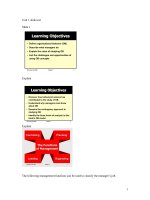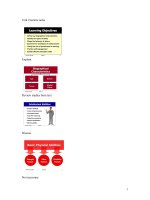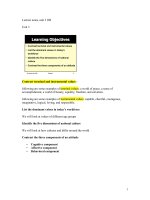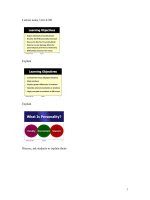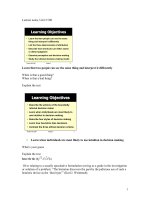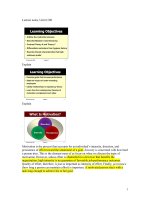Organizational behavior: Lecture 24 - Dr. Mukhtar Ahmed
Bạn đang xem bản rút gọn của tài liệu. Xem và tải ngay bản đầy đủ của tài liệu tại đây (1.13 MB, 53 trang )
Organizational
Behavior
(MGT-502)
Lecture-24
Summary
of
Lecture-23
Leadership
Group
Phenomenon
Influence
and Persuasion
The Basics
of Leadership
Some Form
of Hierarchy
Goal Directed
Behavior
Distinctions Between
Managers and Leaders
Leaders
– Innovate
– Develop
– Inspire
– Take the long-term
view
– Ask what and why
– Originate
– Challenge the status
quo.
Managers
Administer
Maintain
Control
Have a short-term
view
Ask how and when
Accept the status
quo
What Makes a Good
Leader?
Theories fall into 3 categories:
A. Trait theories
– look for the major characteristic common to all
effective leaders
B. Behavioral theories
– examine the actual behavior of effective leaders to
determine what kinds of behaviors lead to success
C. Contingency theories
– leader effectiveness depends (or is contingent) upon
the interaction of leader behavior and the situation
Trait Theory
People are born with certain
characteristics which make
them leaders.
Behavioral theories
• There are behavioral determinants of
leadership which can be learned.
• People can be trained to be effective
leaders.
Contingency
Theories
Path-Goal Model
Follower/Subordinate
Characteristics
•Locus of control
•Experience
•Ability
Leader
Behavior/Styles
Followers/Subordinates
•Directive
•Supportive
•Participative
•Achievement-oriented
Outcomes
•Perceptions
•Satisfaction
•Motivation
•Performance
Environmental Factors
•Tasks
•Formal authority system
•Work group
Transformational &
Transactional Leaders
Transformational leaders
–Leading -- changing the organization to fit the
environment
–Develop, communicate, enact a vision
Transactional leaders
–Managing -- linking job performance to rewards
–Ensure employees have necessary resources
–Apply contingency leadership theories
Trust and Leadership
Leadership
TRUST
and
INTEGRITY
Today’s Topics
Power
• What is it?
• Do you have any?
• Do you want some?
• How can you get some?
A Definition of Power
A
B
Concept of Power
Power - the ability to influence another
person
Influence - the process of affecting
the thoughts, behavior, & feelings of
another person
Authority - the right to influence
another person
COERCIVE
Exists when one
person believes
another person can
and will provide or
withhold punishment
REWARD
Exists when one
person believes
another person can
and will provide or
withhold rewards
LEGITIMATE
Exists when one
person believes
that another
person has the
right to influence
him or her
(authority)
REFERENT
(CHARISMATIC)
Exists when one person
finds another personally
attractive and wants to be
associated with or
affiliated with that person
EXPERT
Exists when one
person believes
another person has
desired expertise and
is willing to share or
withhold it
RESOURCE
Exists when one person
believes that another
person has desired
(nonexpert) resources
and is willing to share or
withhold them
PRINCIPLES OF
POWER
• Power is perceived
• Power is relative
• Power bases must be coordinated
• Power is a double-edged sword
(used and abused)
Unit of Analysis
Influence
Power
Control

